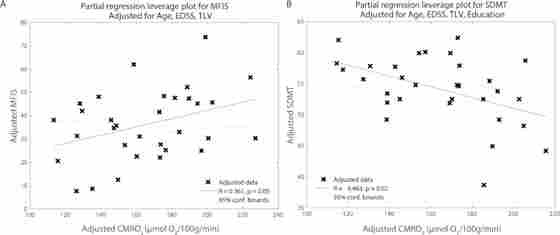Overview
Individuals with multiple sclerosis (MS) typically experience fatigue and cognitive dysfunction, but the mechanisms of those specific symptoms are unknown. Measuring brain oxygen metabolism, this study displays the potential for quick MRI scans to non-invasively monitor the rate of oxygen consumption by the brain. Measuring resting cellular activity through global brain oxygen metabolism, this study hypothesized that resting cellular activity may reflect MS disease activity and predict symptoms of fatigue and cognitive dysfunction. Measuring the oxygen metabolism of the brains of both a healthy control group and individuals with MS revealed lower oxygen metabolism in the MS participants and predicted fatigue and cognitive performance. Those MS patients with higher oxygen metabolism showed reduced density of white matter, suggesting advanced demyelination and autoimmune activity as a result of the disease. These findings suggest that increased brain oxygen levels reflect ongoing demyelination and autoimmune activity which may impact fatigue and cognitive dysfunction.
Figure 1. (Left) Partial linear regression of CMRO2 with MFIS in MS patients after adjusting for age, EDSS, and TLV (R = 0.361, p = 0.05). (Right) Partial linear regression of CMRO2 with SDMT scores in MS patients after adjusting for age, EDSS, TLV, and education (R = −0.463, p = 0.015.).




